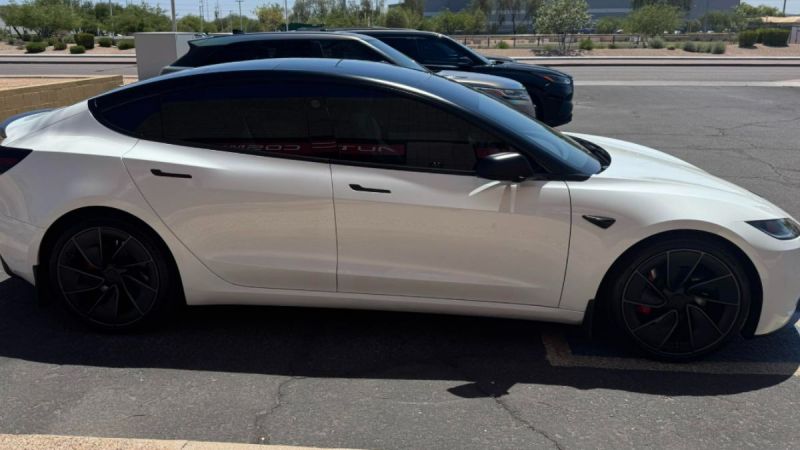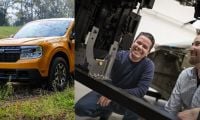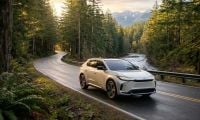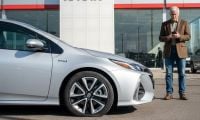There are some moments of car ownership that feel like waking up from a fog. You realize something isn’t working anymore, and once you let go of the old way of doing things, you wonder why you didn’t do it sooner. That was what happened to Polly Esther, whose story I discovered through the “Tesla Owners of Phoenix” Facebook group this evening. She had just been called back into the office after four years of working remotely and quickly realized her BMW X5 no longer made sense with the rising gas prices and maintenance costs that came with daily commuting. So she traded it in for a brand new 2025 Tesla Model 3 Performance and instantly fell in love with the switch.
Here's her own words: "About a month ago, I was recalled back into the office after working at home for four years and I just couldn’t justify the maintenance and gas on my BMW X5 so I traded it in for a 2025 Model 3 Performance. I don’t know why I waited this long. This car is amazing. See you on the 10!"
It’s a sentiment that a lot of former luxury SUV owners are starting to echo. The BMW X5, while undoubtedly powerful and luxurious, is also known for its expensive upkeep once it hits a certain age. Add in the Arizona commute, record-high fuel prices, and the realities of returning to the office, and suddenly a high-performance EV that you can charge at home starts sounding like a smart choice.
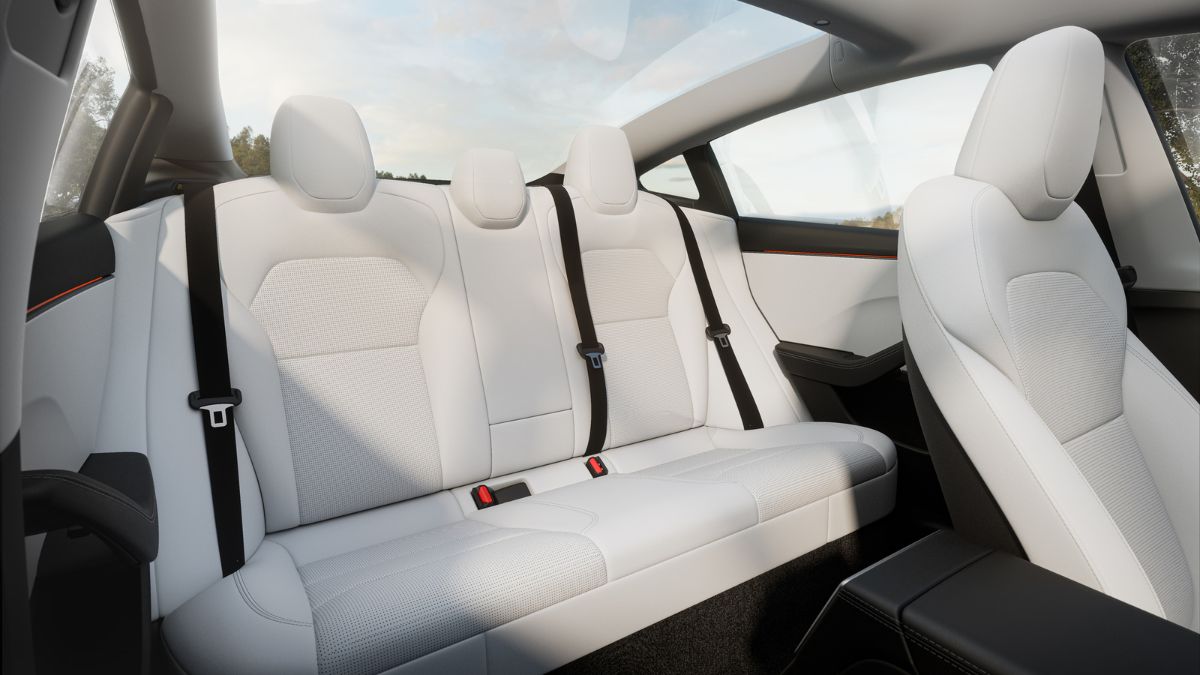
Community Reactions: From Cost to Convenience
Polly’s experience resonated deeply with other group members, and it wasn’t long before the comments section filled with insights and affirmations from fellow Tesla owners who had once been in similar situations.
Randy W. Head jumped in with a comment that really captured the emotional shift many drivers go through once they experience EV ownership: “Nothing like it. People don’t get it. Gas cars need oil changes and gas stations. For Teslas, you have a home charger and on the rare road trip, you plug-in for 10 minutes and you go. Get to stretch your legs. Get a bite to eat. Meet great people when charging. It’s a whole different world. Oh by the way, I don’t have to smell the nasty pollution coming out of tailpipes. Ice is a dead industry in the coming years.”
His point about the social and lifestyle perks of EV charging might seem trivial until you’ve done it yourself. Tesla’s Supercharger network isn’t just about efficiency, but it fosters a kind of community that gas stations never could. And while traditional car owners may worry about range or charging speed, many Tesla drivers find that quick 10–15-minute break to be part of the appeal.
But there are still questions, especially from those new to the Arizona heat. Justin Tyme raised one of the most practical concerns in the comments: “How do the Tesla batteries handle 115° summers?” Polly quickly replied, “Absolutely fine. No problems at all.”
That reassurance isn’t just casual. It reflects a major point of contrast compared to other EVs that have struggled in extreme climates. For example, we recently covered a story about a Rivian R1S that went into turtle mode in 114° Arizona heat, highlighting that not all EVs manage the heat equally.
Ko Konfusion offered another angle: “$1,000 headlights on a BMW is crazy. Never again. Glad I got my Tesla Model S.”
This gets at a truth many luxury SUV owners eventually learn the hard way. It’s not just the gas. The parts, service visits, and random $1,000 bills pile up whether you expect them to or not. The jump to Tesla isn’t always about loving EVs from day one. For a lot of people, it starts as a way to escape the bleeding wallet of premium ICE ownership.
EV Ownership Does Have Its Own Trade-Offs Though
That said, not all transitions are perfect. Some new owners find themselves shocked by registration fees or delivery hiccups. One owner from Washington even said they were considering selling their Model Y after just a year due to outrageous EV fees in their state.
And then there’s the elephant in the room: public perception. It’s not uncommon to hear from potential buyers who hesitate not because of the vehicle, but because of the brand’s image, online debates, or even political baggage. A reader recently wrote that they want to buy a Tesla Cybertruck but aren’t sure if the backlash around the brand has died down enough to feel comfortable driving one. Together, these stories paint a fuller picture of EV ownership. It's a world where convenience, costs, and public perception can all pull in different directions.
Performance That Converts the Skeptics
Yet when it comes to the driving experience, Tesla keeps winning people over. Polly isn’t alone in this case. Plenty of drivers never thought they'd own an EV either, until the Tesla Model 3 Performance opened their eyes and changed everything. The instant torque and seamless tech just clicks for a lot of people.
So that's why I think Polly’s story says more than it seems to on the surface. This wasn’t a dramatic leap into the future or some flashy lifestyle change. It was a practical choice made by someone who simply needed a better tool for the job. And that, to me, is the most interesting part of the EV movement today. We’re no longer talking just about early adopters or tech enthusiasts. We’re talking about real people making smart decisions based on the everyday math of their lives. Gas is expensive, maintenance sucks, and if a Tesla can save you time, money, and headaches while still being fun to drive, then that’s not just a trend. That’s where EV adoption really starts to take root.
Key Takeaways
- Cost of ownership matters more than sticker price. Luxury SUVs like the BMW X5 might look appealing up front, but long-term fuel and maintenance costs can quietly drain your wallet. If you’re commuting again or driving regularly, it’s worth comparing total cost of ownership against something like a Model 3.
- EVs thrive when you adapt to their rhythm. Owning a Tesla doesn’t feel like owning a gas car, and that’s part of the magic. The more you embrace home charging, planned stops, and the quiet convenience of not needing oil changes, the more the ownership experience makes sense.
- Arizona heat is brutal and a great stress test. Tesla's resilience in scorching weather offers reassurance for those worried about battery degradation or thermal limits, especially when other EVs have already shown vulnerabilities.
- Lifestyle changes drive automotive choices. Getting called back into the office may not seem like a car-related moment, but for Polly and many others, that was the catalyst. Life changes create car changes, and EVs are increasingly the answer.
- There’s no one-size-fits-all, but sometimes the fit is obvious. Not everyone will love the Tesla Model 3 Performance. But if your current car feels like a hassle, a financial drain, or a chore to drive, it’s worth test-driving something different. You might be surprised at how quickly you fall in love with the change.
What Do You Think?
Have you ever owned a gas car that just stopped making sense for your lifestyle? What finally pushed you to consider switching to an EV?
And if you're still on the fence, what are the things that are holding you back?
Don't hesitate to drop your thoughts into the comments. We’d love to hear how your car choices are evolving.
Aram Krajekian is a young automotive journalist bringing a fresh perspective to his coverage of the evolving automotive landscape. Follow Aram on X and LinkedIn for daily news coverage about cars.
Image Sources: The “Tesla Owners of Phoenix” public Facebook group and Tesla’s gallery, respectively.


